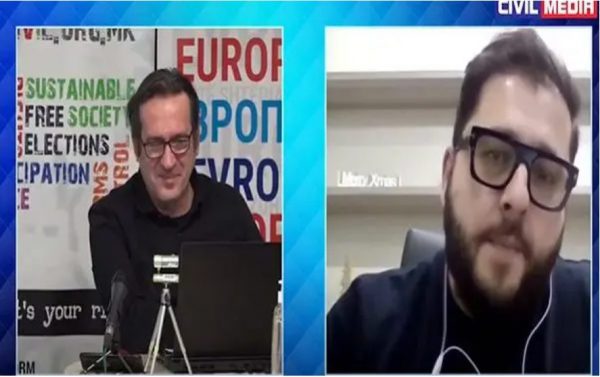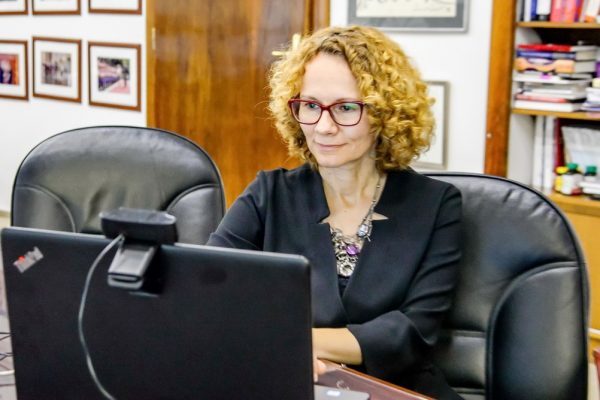The Director of the Innovation Fund, Kosta Petrov, at the Conference “Perspectives 2021” announced novelties in the work of the Fund, ie, referred to the digitalization of society and business in the country, the role of the start-up system in the Macedonian economy, and the novelty “Digital nomads ”with which the Innovation Fund will actively participate in creating and supporting the economy in the country.
– It is interesting because 2020 was a very difficult year, but I always try to see the positive things. We talk about digitalization all the time, and in 2020 digitalization happened to us, whether we like it or not. The fact that this meeting is currently being held through Zoom, means that we have already boarded the train for digitalization, and there is no going back. But on the other hand, looking at our economy, the economic topics that were discussed before the pandemic itself, and looking at what is happening now, there is a huge shift, that for the first time we start talking about things that were not talked about before. Today we are talking about the active participation of startups in the Macedonian economy. We are talking about how the new wave of businessmen and entrepreneurs can change the economy, through their innovative products. And that is really a positive thing. We here at the Fund, two weeks ago launched our start-up council for the first time in the history of our country, a start-up council that together with the Government will work on a set of legal changes that will enable the development of the Macedonian start-up eco system . If one can change the perception of what it means to be an entrepreneur, what it means to be a businessman, what it means to conquer the market with an idea, and not politically, startups have that power.
They developed in the country without any state aid. We have a start-up eco system, which is developing without intervention and assistance from the state, says Petrov.
The question I ask as the director of the Fund is, if the state actively participates in creating that start-up, and developing a start-up ecosystem, imagine the results that can be achieved. My position now, even before I became director, is that the only story we can build for Macedonia is through startups, through innovation. We have no oil, we have no gas, we are positioned in such a turbulent region of interest, and the only story that will be ours, and only ours, is innovation. Interestingly, this year, although difficult for many companies, was a year in which many people dared to start their own company, and I ask the media to talk about positive stories. The fact is that young people are moving, and the fact is that it is a global phenomenon. And young people should experience what it is like to work abroad, to get that experience, but let’s not forget what I call – Macedonian start-up heroes. People that, believe me, many know about, and create local products that are sold globally. We must give them space, and we as the Government, and you as media and organizations, to talk about these companies, because if someone will change the perception of our country, they are exactly them.
Petrov explained the meaning of the term “digital nomads”, and presented the strategy of creating a new workforce to support the Macedonian economy, prepared by the Innovation Fund, with the support of the Ministry of Interior and the Government.
– With the development of digitalization, even before Covid-19 happened, a new workforce is already being created for people who work “remotely”, meaning they do not work in an office, have a contract with a company, work from home, decide for themselves where to work , whether they work from an office, whether they stay in America or England. The trend of digital nomadism was started by Estonia, currently Georgia is active, there are about 850 digital nomads, foreigners who work for a foreign company, but decided to live in Georgia . They do not work in Georgia, but live in Georgia, and two weeks ago Croatia did the same. Which means that Georgia and Croatia are the countries that create that digital nomad strategy. Before I became the director of the Fund, with my friends from start-up Macedonia, an organization that in a way works with the Macedonian start-up eco system, we started receiving information that there are many digital nomads in Ohrid, that foreigners come to Skopje who are not tourists, people who saw the living conditions in Macedonia, did the math that rent, food, restaurants are cheaper, have a certain income, and decided to live here. It can stay that way, whoever wants to come, stay for three months and then have to leave the country… We want to do it a little more strategically, and we are already working, with the involvement of the Ministry of Interior, for a strategy for digital nomads. This means that people who work “remotely”, have a job somewhere, for another company, we will enable them to come to live in Macedonia, and get a residence permit based on economic interest. To do this, legal changes are needed that the Ministry of Interior is already working on, with a list of countries that will be allowed to do so, the person to have certain income, should have health insurance during the stay in our country, and receives a digital visa that regulates his/her stay, for as many days, months, as the person has requested. This will not only help economically, because those people will have to rent apartments, they will actively participate in our economy, but those people will also help develop our start-up system. No matter how critical we are towards Macedonia and the conditions here, the fact is that we do research, foreigners living here, enjoy our country. Also, many of the things we do not know, we learn from them. If it goes according to plan, and I believe it will, in the first half of 2021, we will launch an online visa for digital nomads, and we will allow those digital nomads to come to live in Macedonia, to actively participate in our economy. The second step is, after many discussions, Makedonsko Selo in Nerezi, through partner organizations we will transfer it to a digital Nomad-village, a space where digital nomads can live, participate in events, connect with Macedonian startups, etc. So, again, if it weren’t for the crisis, we would never be talking about digital nomads. This crisis has opened topics for which I hope we will have the support of both the Government and all political parties, because innovation does not know a political party, does not know a party booklet, and in my opinion, this is the only unique story we can create for which no one can say “this is our story, do not take it from us”… Innovation is our unique story.

















